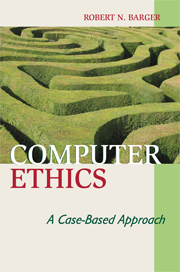Book contents
- Frontmatter
- Contents
- Preface
- Acknowledgments
- 1 Introduction
- 2 The Computer as a Humanizing Agent
- 3 Philosophic Belief Systems
- 4 A Philosophic Inventory
- 5 The Possibility of a Unifying Ethical Theory
- 6 The Ethical Decision-Making Process
- 7 Psychology and Computer Ethics
- 8 The Computing Field as a Profession
- 9 Computer-Related Codes of Ethics
- 10 Computer Ethics and International Development
- 11 Robotics and Ethics
- 12 Theft and Piracy Concerns
- 13 Cases Concerning Theft and Piracy
- 14 Privacy Concerns
- 15 Cases Concerning Privacy
- 16 Power Concerns
- 17 Cases Concerning Power
- 18 A Miscellaneous Collection of Cases
- 19 Parasitic Computing Case
- Appendix: Topics for Presentations, Discussions, and Papers
- Notes
- Selected Bibliography
- Index
10 - Computer Ethics and International Development
Published online by Cambridge University Press: 05 June 2012
- Frontmatter
- Contents
- Preface
- Acknowledgments
- 1 Introduction
- 2 The Computer as a Humanizing Agent
- 3 Philosophic Belief Systems
- 4 A Philosophic Inventory
- 5 The Possibility of a Unifying Ethical Theory
- 6 The Ethical Decision-Making Process
- 7 Psychology and Computer Ethics
- 8 The Computing Field as a Profession
- 9 Computer-Related Codes of Ethics
- 10 Computer Ethics and International Development
- 11 Robotics and Ethics
- 12 Theft and Piracy Concerns
- 13 Cases Concerning Theft and Piracy
- 14 Privacy Concerns
- 15 Cases Concerning Privacy
- 16 Power Concerns
- 17 Cases Concerning Power
- 18 A Miscellaneous Collection of Cases
- 19 Parasitic Computing Case
- Appendix: Topics for Presentations, Discussions, and Papers
- Notes
- Selected Bibliography
- Index
Summary
Introduction
One of the areas in which the rapid growth of technology, especially digital technology, is having a huge impact is international development. It is causing a “digital divide,” that is, a widening of the gulf between nations that have well-developed technologies and those that have little or none. To remedy this problem, the United Nations has organized a program called the World Summit on the Information Society (WSIS). A brief consideration of this Summit will identify some of the problems that a lack of technology, or an imbalance of technology, has caused in the area of international development and some suggestions for possible solutions to these problems.
The World Summit on the Information Society
The World Summit on the Information Society is a worldwide effort to improve and make more equitable the communication of information throughout the nations of the world. Specifically, WSIS defines itself in these words: “The digital revolution in information and communication technologies has created the platform for a free flow of information, ideas and knowledge across the globe. This revolution has made a profound impression on the way the world functions. The Internet has become an important global resource, a resource that is critical to both the developed world as a business and social tool and the developing world as a passport to equitable participation, as well as economic, social and educational development.
Information
- Type
- Chapter
- Information
- Computer EthicsA Case-based Approach, pp. 107 - 139Publisher: Cambridge University PressPrint publication year: 2008
